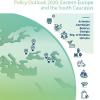Innovation and Competitiveness Policies (ICP) Press Releases
Displaying Results 1 - 21 of 21
Like other countries of Eastern Europe and the South Caucasus (EESC), Belarus has undergone a transition from a centrally planned to a market economy over the past three decades. This transition has stagnated, as current growth drivers wane. Systematic institutional constraints and low levels of
The six economies in Eastern Europe and the South Caucasus (EESC) - Armenia, Azerbaijan, Belarus, Georgia, the Republic of Moldova, Ukraine - have grown rapidly following a rocky and difficult transition from centrally planned to market economies over the past decades. Countries such as Georgia
Those hoping to see increased cooperation between the public and private sectors to achieve the Sustainable Development Goals (SDG) were given a boost on Wednesday 7 May to 8 May when the Heads of the UN Regional Commissions decided to share a platform and give their support to new forms of
The Belt and Road Initiative, launched by China in 2013, comprising the Silk Road Economic Belt and the 21st Century Maritime Silk Road, is aimed at building a trade and infrastructure network along ancient trade routes connecting Asia with Europe, Africa and beyond.
The initiative has so far
770 million people around the world lack access to clean water, while 2.5 billion people do not have adequate sanitation services. These staggering statistics by the World Bank highlight the need for increased infrastructure investment in water and sanitation services if the ambitious targets in
During the last five years, Belarus has undertaken important measures to upgrade its national innovation system. These include legislative changes to encourage the commercialization of intellectual property, the centralisation of its innovation funds, and the inclusion of innovation enhancing
On the occasion of the official launch of the UNECE Innovation Performance Review of Armenia in Yerevan on 14 November 2014, the two sides agreed to cooperate on innovation policy reform. Under the agreement, which is to be signed at the 66th session of the Economic Commission for Europe in April
UNECE will incorporate new approaches to innovation at the regional level in its policy advice to Governments, including in upcoming national Innovation Performance Reviews for Tajikistan, Azerbaijan, and Belarus.This is one of the outcomes of an international conference on “Smart Specialisation
Innovation is traditionally thought of as the province of the business sector, with the government responsible for creating a business climate friendly to innovators. However, public expenditure accounts for between a third and over half of Gross Domestic Product in the countries of the UNECE
Innovation is a key driver of sustainable prosperity, and entrepreneurs are key driving forces behind innovation. To promote innovative entrepreneurship, particularly in Southeast Europe, UNECE and the Croatian Ministry of Entrepreneurship and Crafts jointly organized an international conference
Two UNECE capacity-building events for policymakers, Ashgabat, 15-17 May. Countries wishing to adopt innovative green technologies need the right policies and enabling environment. They also need suitable infrastructure, good access to external knowledge, and well-trained personnel. From 15 to 17
The globalisation of research and development activities and the increased relevance of cross-border issues for innovation worldwide have been accompanied by the emergence of regions that act as innovation drivers within countries, including sometimes with a cross-border significance. Mobilizing
AstanaThe Innovation Forum, which was held in Astana on 5-6th December 2011, aimed to showcase the achievements of the Republic of Kazakhstan in its 20 years of independence and outline future plans for the promotion of innovation. In this important forum and in the presence of Prime Minister
Geneva Fostering innovation occupies a central position in strategies to enhance national competitiveness, serving to increase productivity and providing the foundation for sustained economic growth. Collaboration between the public and private sectors, including in the development of key
Geneva Rapid technological change has transformed the global economy and made possible new business practices and ways to access the markets by entrepreneurs. However, traditional barriers to entrepreneurship are still an obstacle to the development of knowledge-intensive entrepreneurial
GenevaEco-innovation can provide an effective answer to address environmental challenges and overcome resource constraints, but public interventions in this area are complex and need to guided by a consistent long-term vision that encourages the involvement of private investors. This
Geneva UNECE releases its Innovation Performance Review of Belarus. The publication, which just came out of print, was presented at the fourth session of the UNECE Team of Specialists on Innovation and Competitiveness Policies, Geneva, 12-13 May 2011.The Innovation Performance Review of
Geneva Innovation is a key driver of growth, competitiveness, and prosperity in the modern economy. Therefore, governments are in constant search of possible policy actions aimed at stimulating innovation activity, enhancing the innovative capacity of the economy and improving the efficiency
Geneva Many UNECE countries with emerging market economies have a well-established tradition in academic and applied research. However, the commercialization of the results of research and development (R&D), which is pivotal for the competitiveness of the modern economy, often faces
Geneva “Science, technology and innovation increasingly determine economic performance, the new employment opportunities and the competitiveness of industries and nations. Innovation is thus a major source of competitive advantage including during periods of dramatic change as in the current
Geneva The development of services is a major source of productivity growth in modern economies, as it provides critical inputs for other activities and makes possible new forms of activities and business models.Despite the increasing importance of services, the promotion of innovation in

